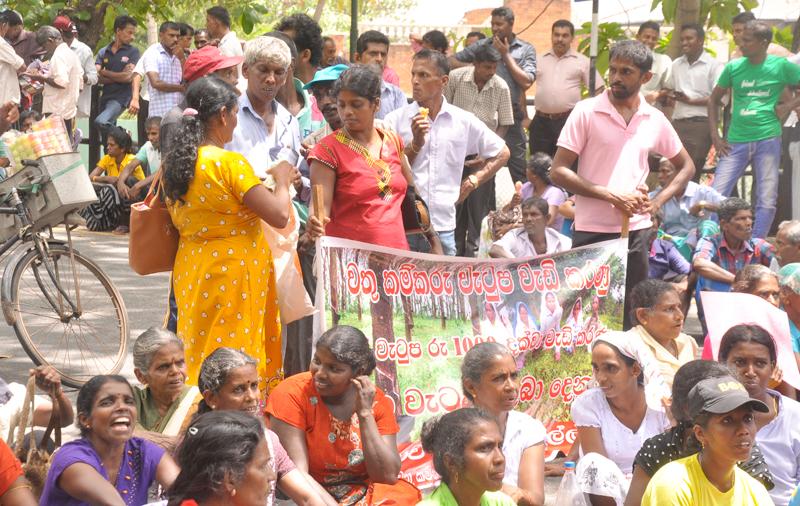
The negotiations between the plantation unions and plantation companies over the daily wage of workers have reached a stalemate with both parties sticking to their guns. Neither party is willing to give in.
The Collective Agreement that binds Regional Plantation Companies (RPCs) to a basic daily wage for workers during a two-year period, expired last month.
However, to-date there has not been a breakthrough in discussions between the RPCs and Plantation Unions who demand a Rs. 1,000 daily wage for workers.
Ceylon Workers Congress (CWC) Trade Union Advisor Muthusivalingam said the unions will not budge an inch from their original demand for a Rs. 1,000 wage increase on daily work as the cost of living has skyrocketed making life hard for workers.
“We have made it clear in no uncertain terms that the daily wage of workers should be raised to an acceptable level given the financial difficulties the workers are faced with. Plantation companies have not even come close to granting our demand,” Muthusivalingam said.
However, he said the unions will continue to engage in negotiations to reach an agreement.
Meanwhile President Maithripala Sirisena and Prime Minister Mahinda Rajapaksa have called on both parties to solve the issue amicably as soon as possible.
The other side of the coin is that according to the RPCs, a worker has been offered the best wage model as compared to many tea producing countries in the world.
A spokesman for the Planters’ Association (PA) said RPCs have offered a revenue sharing model which enables a worker to easily earn Rs. 1,000 a day.
“The archaic ‘day wage model’ is neither beneficial to workers nor plantation companies as both are confined to a production limit.
It’s high time the perennial daily wage model is done away with and a sustainable wage model, based on production, is adopted that would enable workers to earn based on the quantity of harvest, which could easily go beyond the present norm ” the PA spokesman said.
“We have offered the best package for workers whose take home salary when added up with all incentives comes up to Rs. 940. Doubling the basic wage from the current Rs. 500 to Rs. 1,000 is unaffordable to RPCs who are facing problems on many fronts,” the PA spokesman said.
The latest proposal of the RPCs comprises Rs. 135 increase per day, a 20 percent increase on the basic wage, 17 percent increase on the total wage and an increase of Rs. 3,375 per month per worker.
According to the PA spokesman the current plucking average is close to 20 Kgs per day in the RPC sector and many RPCs are well over this figure even while working under the inefficient attendance based daily wage system.
The current plucking average in Sri Lanka is 18 kilos whereas it is 60 kgs in Kenya and 50 kgs in South India with a norm of 40-kgs and 34 kgs respectively. In terms of daily wages a Kenyan harvester earns Rs. 443.3 and a South Indian Rs. 487.2
RPC officials say there has to be a sustainable wage increase model for plantations workers to keep the industry and the occupation of workers going amidst a very challenging global scenario that has put the plantation industry into a precarious position today.
“The 18 plantation companies are not in a position to pay Rs. 1,000 as tea prices at the Colombo Auction have dropped drastically. The average price of a kilogram of tea at the auction held at end October was Rs. 570 and rubber Rs. 280. On the contrary the cost of production per kg of tea was Rs. 630 and rubber Rs. 380,” the PA spokesman said.
According to statistics, labour accounts for the largest component in the cost of production taking 60-70 % of the share while materials such as firewood, fuel, fertiliser, packing material and physical goods amount to around 15%, essential services such as insurance, medical care and taxes account for six%, miscellaneous expenses four% and staff and management expenses account for 8% of the cost of production.
The dearth of workers is another issue that has plagued the plantation sector with the number dropping to almost half from the time the sector was privatised in 1992. The number of workers has plummeted from around 320,000 to 150,000.
RPCs say that given the current numbers of workers they are unable to even pluck three rounds a month. Theoretically it has to be four rounds a month.
The absence of the popular weed killer glyphostae for over two years caused a colossal loss to the plantation sector production levels.
The application of alternative chemicals resulted in countries such as Japan rejecting consignments from Sri Lanka early this year.
However, according industry experts and analysts, unless and until the industry is rid of politics, no amount of incentives and worker motivational solutions will help sustain the 150-year industry that has been the lifeblood of the country for many generations.
